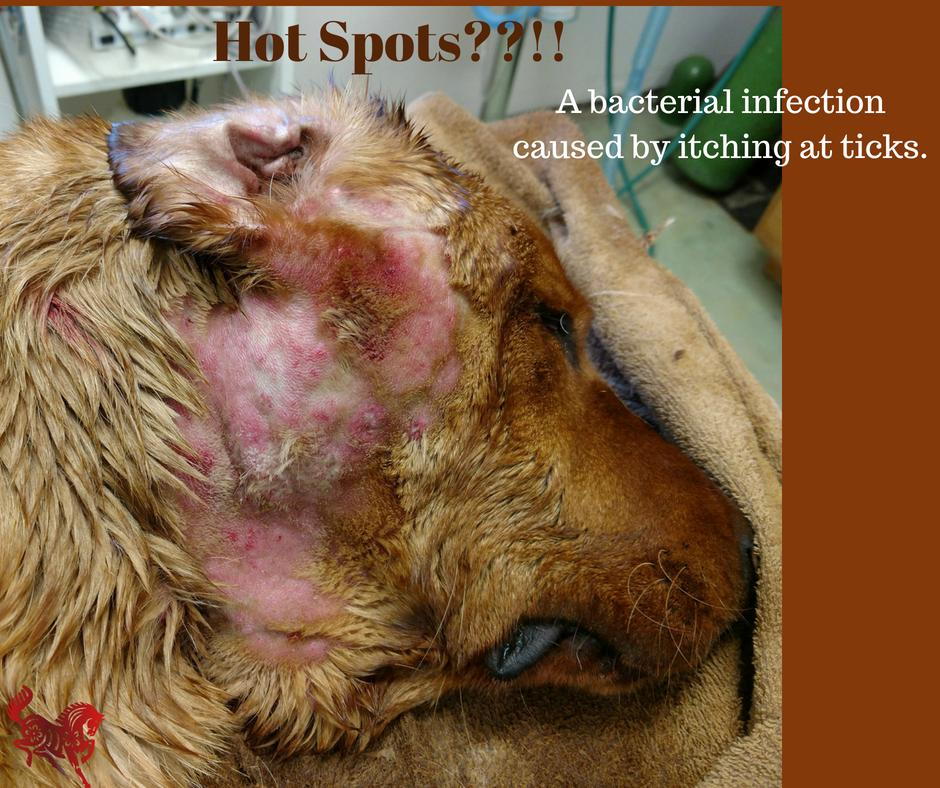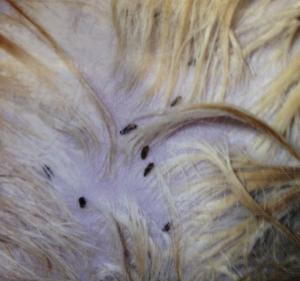
Are you wondering why your dog’s coat isn’t thick and luxurious? Or are you just wondering why he is itching himself raw? Many of our pets have skin problems that manifest as a dull haircoat or naked spots or maybe your dog is always itching, scratching and chewing. Here are some of the most common causes of skin problems in dogs and how to treat these.
-
Itchy skin: This is a very common complaint about dogs especially. And can account for most of our appointments in the spring, summer, and fall. It’s easy to think that itchy skin is simply dry skin. This may be true. Dogs and cats can have dry, flaky skin and it usually itchy. Dry skin happens more often in the winter than the summer. There is less moisture in the atmosphere in the winter. This can be addressed by using a humidifier and adding some fish oil or Omega 3 fatty acids to the diet. Itchy skin is also very common in the summer and this skin is usually anything but dry. Often this skin is greasy and damp. These pets are suffering from both bacterial and yeast infections and their skin is very red and irritated. The most important part of treating this condition is finding what is making the infection happen and treat this. Looking at a sample in the clinic will tell us if it’s bacteria, yeast or both. Many times, we send a sample in to find the best antibiotic to treat this. It’s really important to find the underlying cause of the irritation. These pets are miserable. It’s hard to enjoy things when you want to chew your leg off. There is often secondary trauma from the nails and teeth as the pet itches.
-
Open sores and hot spots: These are often an extension of #1. A “hot spot” is an area that usually round, red and very moist with dermatitis. These can be caused by skin irritation from a tick bite or a hair mat that has started to rub on the skin. Treatment for these is similar to #1. Find out what is living on the skin and treat this. When these sores are under mats it’s important to trim the hair and remove the mats. This is a prime place for flies to lay their eggs and hatch into maggots. This complicates treatment. Maggots make the infection worse and make it easier to spread.

-
Itchy, smelly ears: Hands down, this is probably the most common skin problem we see here at the clinic. We see this year around, definitely worse in the summer. Dogs with floppy ears who like to swim are most at risk. The floppy ears will hold the moisture and the heat, creating the perfect environment for bacteria and yeast to grow. Treatment involves cleaning the ear canals as much as possible and applying medication into the ear canal. These pets often need oral medications too. PLEASE!!! DO NOT USE PEROXIDE IN YOUR DOG’S EARS!!! Most ears can be cleaned up good enough with a mild cleanser. Peroxide in the ear can be very painful and if their eardrum has ruptured it can be excruciating.
-
Allergies: In dogs, allergies show up as itchy feet and ears. They don’t develop the hayfever type of symptoms that people get. Dogs can be allergic to many different things in the environment like tree pollen, dust mites, grasses and different foods. Sound familiar?? Pets with severe allergies will be allergic to many environmental things and foods. These pets are living in a state of constant inflammation. They often have leaky gut as well as itchy skin and smelly ears. These can be a bit more difficult to treat but very satisfying when it works out! Read about Dakota here! She has many allergies and is now doing really well.
-
Fleas and Ticks: These nasty no-good bugs cause all kinds of problems in our pets. Our pets can become very itchy from either or both of these. Ticks come out in the spring and usually go away for a bit in the heat of the summer. In wetter years, they are a problem all through until fall. The bites can be very itchy and pets can react to the saliva. Ticks also carry many different diseases like Rocky Mountain Spotted Fever and Lyme’s disease. These can make our pets very sick. Fleas also feast on our pets. The adults need a blood meal to survive and reproduce. There is never just 1 flea either. When there is 1 there are 1000’s of them. UGH. Pets can be allergic to some of the proteins in flea saliva too. We call this Flea Allergy Dermatitis. It only takes 1 flea to make a FAD pet miserable. This happens to both cats and dogs. Getting rid of the parasites is the first step to helping these pets feel better.

-
Hair loss: This is kind of a catch-all symptom. Pet’s can lose hair when they’re affected by any of the problems already discussed. Hair loss is also common in pets who have other diseases like low or high thyroid problems. Other endocrine diseases cause hair loss and thinning of the skin. These pets have a very specific appearance. They are often almost naked except for the hair on their heads and feet. They will likely have a pot belly appearance and the skin around their bellies will look thin.
-
Mange: This is usually the first “diagnosis” people come up with on social media. In the real world, it’s pretty rare in most areas. Mange is caused by different kinds of mites. These mites live in the skin. They eat the skin for nourishment and then poop under the skin too. They’re just super gross! Most of these mites aren’t contagious to people. There is one type that is contagious to people. Treatment for mange has gotten easier now than ever before. Diagnosis is usually done right in our office. We take a few samples of the skin and look under the microscope for mites or eggs. Treatment needs to go for at least 6 months and often 9-12 months.
Curing itchy skin is a team effort between the family of the pet and us. We can find out what is making your pet itch. We can also send home proper medications to treat this. At home, the family will need to give the medications, give that bath, use the medicated wipes, change the diet. It can happen as fast as 3 days or take up to 4-5 months before you see much improvement. We have so many tools to make this works. We use antibiotics, antifungal, medicated shampoos and wipes, medications that help stop the itch, Acupuncture, Chinese herbs to help the pattern causing the itch.
If your pet is having some itching and scratching problems, give us a call!
